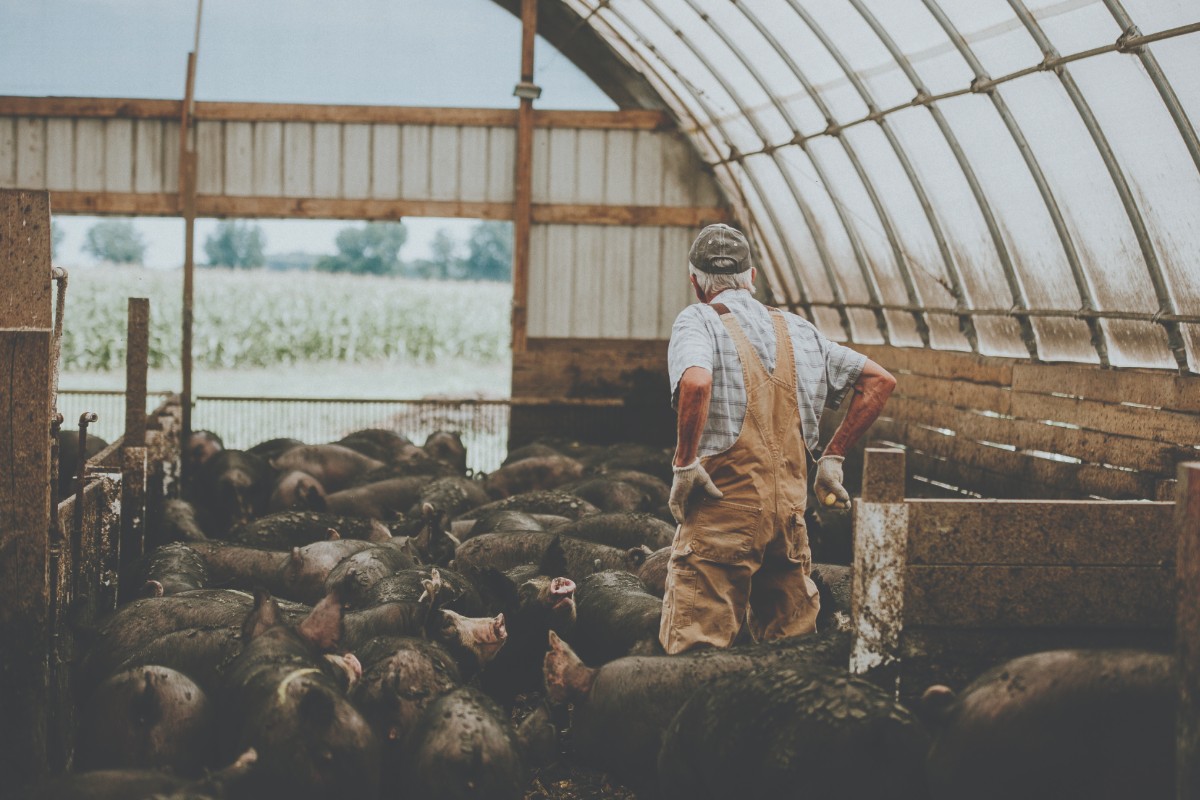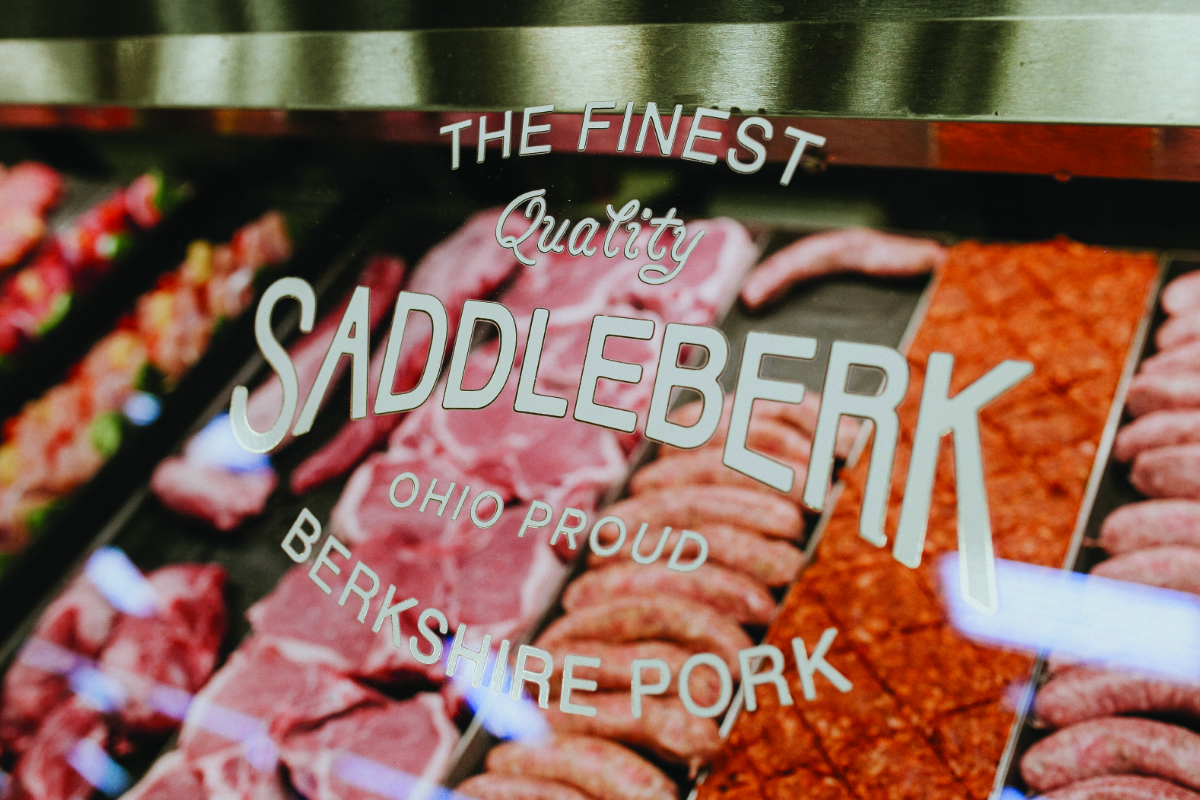The founders of Saddleberk Farms started the company with a desire to produce high-quality pork products consumers would crave. They worked with The College of Food, Agriculture and Environmental Sciences at The Ohio State Univ. (OSU) to determine the Berkshire pig as the preferred breed of pork to be used in its products.
“There were some obvious issues as far as production of the breed, that’s why a lot of people aren’t into this breed of pig,” says Dave Rigo, CEO of Saddleberk Farms, based near Lancaster, Ohio. “They tend to produce five or six piglets per litter versus 12 on the commercial side, so it’s more expensive to raise them,” he says. “But the meat quality is that much higher.”
The company partnered with Kroger stores in the Columbus, Ohio, region in 2014 to provide a high-quality line of pork to the retailer and began producing just six to seven pigs a week. Today, Saddleberk processes approximately 70 pigs per week and has partnered with Michael’s Finer Meats & Seafoods LLC (acquired by The Chef’s Warehouse in 2012) to distribute to restaurants in addition to Kroger stores and Heinen’s grocery stores in the Cleveland area.
Michael’s, once a regional player in Ohio and the surrounding states, began distributing nationally after the Chef’s Warehouse acquisition.
“I think they’re in every state except maybe Hawaii,” Rigo says.
Production and processing
Saddleberk operates five contract farms, including one that is owned by one of the partners’ fathers. The farms only raise Saddleberk’s Berkshire pigs, usually in addition to farming grains. The farms started with a few sows and grew slowly over time. Farms consist of between 50 and 120 sows each. Saddleberk works with three “flexible” farms that also produce 100 percent Berkshire pigs. Saddleberk doesn’t guarantee it will buy all the pigs from the flexible farms but has the option to source them as needed.
The producer sends hogs to federally inspected Pickaway Correctional Facility for processing everything down to primals and sausage through the Ohio Dept. of Rehabilitation and Correction Meat Processing Career Center. In addition to processing at Pickaway, the company uses Phillips Processing in Zanesville, Ohio, for the further processing of its bacon and spiral cut ham, and Dee-Jay’s Custom Butchering in Fredericktown, Ohio, for one specific ham that goes to Michael’s Finer Meats for distribution.
“Pickaway Correctional does an amazing job,” Rigo says. “There are quite a few graduates of that program who serve their time, get out and get employment at either Kroger or a processing plant outside of the prison system, so we really like that aspect of it.”

Special sausage
Saddleberk produces between 3,500 lbs. and 4,000 lbs. of sausage a week out of Pickaway Correctional Facility. The sausage products go to Kroger and Heinen’s stores in Ohio. Saddleberk offers a variety of sausage available year-round, including Sun Dried Tomato, Blueberry Maple, Chipotle Jalapeño and Sweet Italian, along with seasonal varieties like Pineapple Teriyaki and Honey Chipotle, sold at the fresh meat counter and tray wrapped for sale in the case.
“The Blueberry Maple sausage is by far our biggest seller,” Rigo says.
An ex-Kroger meat manager formulates flavors and recipes for Saddleberk sausages at an in-house facility in 20- to 30-lb. batches.
“We get together about twice a year to taste anywhere from six to 10 different varieties of sausage and then we usually pick one or two of those for seasonal varieties that we offer at Kroger,” Rigo says.
The timing of formulations depends on a seasonal calendar Kroger and Saddleberk developed over the years. The calendar outlines the sausages available up to 18 months ahead of time. If it’s getting close to the time company executives need to present new ideas to Kroger officials, recipes start coming to life.
“We get together and we talk, and fortunately enjoy some pretty good sausage,” Rigo says. “That’s not the worst day.”
Saddleberk only freezes sausage and only for a maximum of four weeks before it goes to the company’s retail customers. All other products and primals are fresh.
Berkshire bacon
Less than six months ago, Saddleberk Farms started making bacon and supplying it to Kroger stores in Ohio, as well as Michael’s Finer Meats for foodservice.
Rigo, says the Berkshire breed of pig is “prized for its belly,” which makes some of the best bacon available. To date, Saddleberk routinely sells out of bacon every week.
“Unfortunatly we don’t have enough to go around for both Kroger and Michaels,” Rigo says. “It’s been a good problem to have, but it’s one of those things. You wish you could just produce a pig that is nothing but belly.”
Selling saddleberk
The owners of Saddleberk recruited Rigo when the company needed a little push to hit its growth potential. In his first year, starting in December of 2018, Rigo grew the producer from roughly 40 pigs a week to 70. Much of that came from an untapped foodservice industry, Rigo’s former stomping grounds.
“I come from that line of work, calling on restaurants,” he says. “I got here and ultimately saw an opportunity there.”
Upon arrival Rigo began meeting with distributors but didn’t really click with any of them initially. He felt the level of quality Saddleberk produced deserved a special distributor. When he met with the owner of Michael’s in April of 2019, the two hit it off and he liked that Michael’s still operated independently after the acquisition by Chef’s Warehouse. Rigo believed Michael’s made a great fit for Saddleberk and pursued the relationship.
“It was more of us selling it to them versus other distributors that wanted it,” Rigo says.
Michael’s assured Rigo and Saddleberk that it would handle the business correctly and emphasize making the most of the deal for both companies. The partnership has blossomed and grown, and Rigo and Saddleberk are thoroughly satisfied with the relationship.
“They’ve gotten us into a number of different restaurants around the country,” Rigo says. “There’s obviously a focus here in Ohio, but in general, we’re in Chicago and Beverly Hills and all kinds of different places in multiple different restaurants. It’s kind of nice to claim that we have a restaurant in Beverly Hills that serves our pork.”
Once Pickaway breaks carcasses down to primals, Michael’s also does a few specific cuts at its shop for Columbus-based Cameron Mitchell Restaurants.
While retail remains the bulk of Saddleberk’s business, Rigo believes the restaurant sector offers great, untapped growth potential for the company. He compares the popularity of high-end breeds of beef such as Kobe and wagyu, and their rise in mainstream notoriety with consumers, to what Berkshire pork is starting to become.
“I think we’re just barely tapping the surface with the higher end pork breeds,” he says. “I think as that continues to evolve and people understand more about it and the higher quality, restaurants will demand it more and more and you’ll see it on a lot more menus in the coming years.”

Controlled growth
To maintain the quality Saddleberk strives to achieve, the company takes meat samples from Pickaway and audits farms at least quarterly. Saddleberk checks samples for marbling and pH while farms are audited for humane handling practices and animal well-being.
“We have certain animal welfare standards that we want to maintain,” Rigo says. “We make sure the animals all have access to open air and straw bedding. There’s definitely something to the fact that happy animals produce better quality. It’s good, both the animal welfare aspect and the finished product.”
Unlike the beef industry’s prime, choice and select grades, which come from a technical standard, pork relies on the knowledge of experts and those with industry experience to gauge quality. Other than using OSU occasionally to sample the meat quality and ensure the pH meet Saddleberk’s specifications, Saddleberk maintains quality itself.
“It’s us making sure,” Rigo says, “there’s no professional auditing firm that we use or anything like that.”
In addition to monitoring and ensuring quality, Rigo and Saddleberk focus on relationships with current and potential custormers. In the past year, Saddleberk has grown its business about 75 percent, but as growth continues, those percentages will naturally go down.
Currently, Saddleberk sells nearly everything it produces weekly, and prefers to operate that way rather than carrying an inventory for which it will need to find customers.
“We’re looking for more partners that want to be long-term partners,” Rigo says. “In our business, you can’t put 20 or 30 more sows down and then have a customer go bad on you and have a glut of pork that you can’t sell.”
Rigo says Kroger and Heinen’s have been “…absolutely fantastic to work with.” With the two local retailers ordering mostly sausage products, Rigo sees a future where both carry a more diverse product mix, as well as seeing that product mix across a more regional landscape.
“It would be nice to get a few more retailers and then obviously continue to grow the restaurant and foodservice business,” he says.


